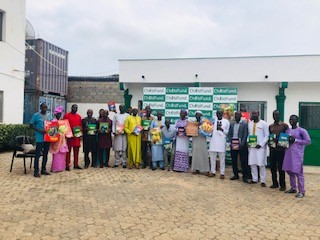By Yunus S Saliu
At least 30 young girls and women successfully concluded a three-day training programme organized by the Comprehensive Health Education (CHE) team on how to sew and produce different types of reusable sanitary pads.
The training held at the Buffa Zone, Tallinding, Kanifing Municipal Council, among other things was meant to build the young girls and women’s capacity and as well empower them on how to make the reusable pads for their personal use and hygiene especially on how to keep themselves clean during their menstrual period.
The thirty trained girls and women were drawn from 19 communities in Kanifing Municipal Council, Region, and the training was part of the implementation research on Strengthening Access to Quality Comprehensive Health Education for in and out of school adolescents in The Gambia. The first phase was done in November 2021 in Banjul and was attended by out of school girls drawn from 9 wards in Banjul.
Comprehensive health education (CHE) under the project – Strengthening Access to Quality Comprehensive Health Education in The Gambia is an implementation research project done by the Ministry of Basic and Secondary Education (MoBSE) with funding from International Development Research Center (IDRC). And it is meant to enlighten and educate in and out-of-school students on adolescent sexual and reproductive health (ASRH).
Speaking at the closing of the three-day training program, Deputy Mayor of Kanifing Municipal Council, Binta Janneh Jallow, who did visited the trainees during the training period expressed delights over their performances.
She dilated on the importance of the reusable pads while she encouraged them to take the production very important as they can equally earn a living from it because it is economical and affordable to many people.
The Deputy Mayor applauded the trainer, Fatoumata Gassama for sharing the knowledge with the youths to better their lives, in and extension she thanked the CHE team under the Principal Investigator of the Strengthening Access to Quality Comprehensive Health Education for in-and-out of School Adolescents in The Gambia for the good implementation of the project.
Fatoumata Gassama, founder, CEO of Girl’s Pride disclosed that her association specialized on reusable pads as it is a social enterprise whereby they produce and educate people on how to use them.
She noted that reusable pads are economical and it meets the international standard, while she advised women not to underrate or condemn it to be local products, explained that the reusable pad is made from cotton materials with wax top layer while the material inside (middle) is towel which made it 100 per cent cotton that cannot cause irritation.
Phebian Ina Grant-Sagnia, principal investigator of the project for Strengthening Access to Quality Comprehensive Health Education for in-and-out of School Adolescents in The Gambia congratulated participants for their successful participation in the training.
She explained that reusable sanitary pads are made out of cotton materials, it has no chemicals, it is eco-friendly, saves money and cost effective; in addition it is washable and dries easily.
“Our research findings revealed the issues on menstrual hygiene management and period, young ladies mostly missed school due to lacks of sanitary pad and some parents couldn’t afford buying them for their children,” she disclosed.
According to her, each participant made hand sewn sanitary pads; storage bags within the training period
The Principal Investigator thanked International Development Research Center (IDRC) for funding the project and the Ministry of Basic and Secondary Education for the implementation while appreciated Girl’s Pride official for their supports for the training.
The training closing ceremony was attended by representatives of Curriculum and Research Directorate at Ministry of Basic and Secondary Education (MoBSE); Ward Councilors; Director of Culture and Religion at KMC; Alkalos; parents and youth representatives from KMC and BCC.
Different types of production of reusable sanitary products which included reusable cloth pads. Also, trainees were exposed to different hygienic method on how to keep themselves clean during their menstrual period; reusable sanitary/cloth pads; how to use reusable sanitary pads, caring for cloth pads; importance of using reusable sanitary pads.





